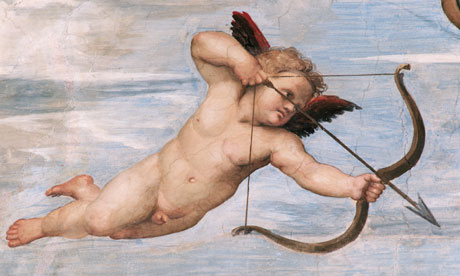It is time to save Valentine's Day from false cupids with 'for sale' signs, and reclaim love as the proper basis for all that we do
Jeanette Winterson - The Guardian,

Cupid lends his name to the desire for both love and money – cupidity being the all-consuming longing for riches. Photograph: Araldo de Luca/Corbis
Occupy Valentine's Day. This is the day to recognise love in every shape and size and disguise. Known love, new love, love's ghosts, love's hopes. Loss is here too, and the spaces in between love.
Reclaiming love is the best thing we can do. Love has been squatted for too long by those false cupids with their "for sale" signs. It's not a coincidence that Venus is the goddess of love and money. Or that her fat friend with the arrows lends his name to desire of both kinds. Cupidity is the all-consuming longing for riches. Love and money are both an exchange.
In 1967 100,000 or so idealists decided to occupy love – in Haight-Ashbury, San Francisco. They stood for communality, sharing, an end to excessive greed, and for peace. This was the Make Love not War generation.
The most conclusive response to this conscious, if chaotic, challenge by love's disciples to the supremacy of power and wealth happened in the mid-80s – the Thatcher/Reagan de-reg years, when money cloned itself as an alternative to every other expression of life. Wealth became the avatar of love; it's sinister flashy alter-ego. Love was for weekends. Love was a leisure activity. Hotels, flowers, chocolates, jewels, celebrity divorces, serial monogamy, porn and prenups. Love as commodity, like everything else. The upgrade generation realised that people could be traded in. Relationship not working? Get a new model.
What happened to love?
Traditionally men have been the suitors and the wooers and women have done the love-work needed to make life more than a series of dates. Commitment means invisible mending every day.
Children need so much love. And then there are friends. Parents. Strangers even. The love-life of a community. Women used to do a lot of that. Now women struggle to manage the love-work on top of everything else. Women are not to blame. We all had a fantasy that love could take of itself. That whatever we did, love would always be there, like oxygen or the sun.
Love is an ecosystem. You can't neglect it, exploit it, strip-mine it, pollute it, and wonder what happened to the birds and the bees.
It's time to re-think love.
Valentine's Day is about romance and sex. I sent my girlfriend a card that said Happy Posh Meal and Hanky Panky Day. It entertained me but it made me think about all the missed opportunities of 14 February.
National Love Day could become the secular sister of the Jewish Day of Atonement. Instead of saying sorry to everyone we have offended, we could hug those we love and who love us – and give some hugs to those who don't get hugged enough.
Love isn't a commodity so it doesn't have to be in short supply.
Full piece at The Guardian.
Reclaiming love is the best thing we can do. Love has been squatted for too long by those false cupids with their "for sale" signs. It's not a coincidence that Venus is the goddess of love and money. Or that her fat friend with the arrows lends his name to desire of both kinds. Cupidity is the all-consuming longing for riches. Love and money are both an exchange.
In 1967 100,000 or so idealists decided to occupy love – in Haight-Ashbury, San Francisco. They stood for communality, sharing, an end to excessive greed, and for peace. This was the Make Love not War generation.
The most conclusive response to this conscious, if chaotic, challenge by love's disciples to the supremacy of power and wealth happened in the mid-80s – the Thatcher/Reagan de-reg years, when money cloned itself as an alternative to every other expression of life. Wealth became the avatar of love; it's sinister flashy alter-ego. Love was for weekends. Love was a leisure activity. Hotels, flowers, chocolates, jewels, celebrity divorces, serial monogamy, porn and prenups. Love as commodity, like everything else. The upgrade generation realised that people could be traded in. Relationship not working? Get a new model.
What happened to love?
Traditionally men have been the suitors and the wooers and women have done the love-work needed to make life more than a series of dates. Commitment means invisible mending every day.
Children need so much love. And then there are friends. Parents. Strangers even. The love-life of a community. Women used to do a lot of that. Now women struggle to manage the love-work on top of everything else. Women are not to blame. We all had a fantasy that love could take of itself. That whatever we did, love would always be there, like oxygen or the sun.
Love is an ecosystem. You can't neglect it, exploit it, strip-mine it, pollute it, and wonder what happened to the birds and the bees.
It's time to re-think love.
Valentine's Day is about romance and sex. I sent my girlfriend a card that said Happy Posh Meal and Hanky Panky Day. It entertained me but it made me think about all the missed opportunities of 14 February.
National Love Day could become the secular sister of the Jewish Day of Atonement. Instead of saying sorry to everyone we have offended, we could hug those we love and who love us – and give some hugs to those who don't get hugged enough.
Love isn't a commodity so it doesn't have to be in short supply.
Full piece at The Guardian.
No comments:
Post a Comment